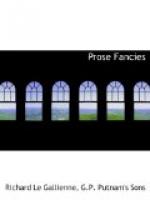Presently a matron and a business man alighted, and two dainty young women, evidently of artistic tendencies, joined the Hammersmith pilgrims. One saw at a glance that they were very sure of their originality. There were no inverted commas around their pretty young heads, bless them! But then Queen Anne houses are as much on a pattern as more commonplace structures, and Bedford Parkians are already being manufactured by celestial stencil. What I specially noticed about them was their plagiarised voices—curious, yearning things, evidently intended to suggest depths of infinite passion, controlled by many a wild and weary past,
’Infinite passion, and
the pain
Of finite souls that yearn’—
the kind of voice, you know, in which Socialist actresses yearn out passages from ‘The Cenci,’ feeling that they do a fearful thing. The voice began, I believe, with Miss Ellen Terry. With her, though, it is charming, for it is, we feel, the voice of real emotion. There are real tears in it. It is her own. But with these ladies, who were discussing the last ‘Independent’ play, it was so evidently a stop pulled out by affectation—the vox inhumana, one might say, for it is a voice unlike anything else to be found in the four elements. It has its counterpart in the imitators of Mr. Beerbohm Tree—young actors who likewise endeavour to make up for the lack of anything like dramatic passion by pretending to control it: the control being feigned by a set jaw or a hard, throaty, uncadenced voice of preternatural solemnity. These ladies, too, wore plagiarised gowns of the most ‘original’ style, plagiarised hats, glittering plagiarised smiles; and yet they so evidently looked down on every one else in the omnibus, whom, perhaps, after all, it had been kinder of me to describe as the hackneyed quotations of humanity, who had probably thought it unnecessary to wear their inverted commas, as they were so well known.
At last I grew impatient of them, and, leaving the omnibus, finished my journey home by the Underground. What was my surprise when I reached it to find our little house wearing inverted commas—two on the chimney, and two on the gate! My wife, too! and the words of endearing salutation with which I greeted her, why, they also to my diseased fancy seemed to leave my lips between quotation marks. There is nothing in which we fancy ourselves so original as in our terms of endearment, nothing in which we are so like all the world; for, alas! there is no euphuism of affection which lovers have not prattled together in springtides long before the Christian era. If you call your wife ‘a chuck,’ so did Othello; and, whatever dainty diminutive you may hit on, Catullus, with his warbling Latin, ‘makes mouths at our speech.’




